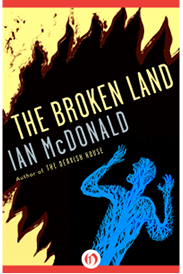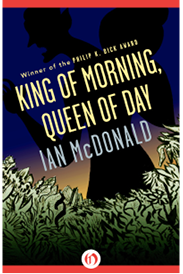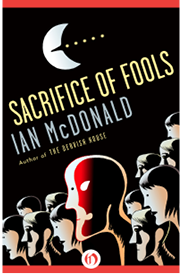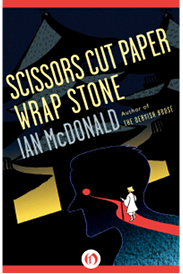Scissors Cut Paper Wrap Stone (26 page)
Read Scissors Cut Paper Wrap Stone Online
Authors: Ian McDonald

“Of course, the expansion of space is not limited by lightspeed,” Cjatay said.
“Still you don’t understand.” A third time, Oga generated the dark energy from the ice beneath his feet and focused it into a narrow beam between the wife-comet and its unimaginably distant husband.
Two particles in contact will remain in quantum entanglement no matter how far they are removed
, Oga thought.
And is that true also for lives?
He dismissed the scalarity generator and brought them out in blackness. Complete, impenetrable, all-enfolding blackness, without a photon of light.
“Do you understand where I have brought you?”
“You’ve taken us beyond the visible horizon,” Cjatay said. “You’ve pushed space so far that the light from the rest of the universe has not had time to reach us. We are isolated from every other part of reality. In a philosophical sense, we are a universe in ourselves.”
“That was what they feared? You feared?”
“That the scalarity drive had the potential to be turned into a weapon of unimaginable power? Oh yes. The ability to remove any enemy from reach, to banish them beyond the edge of the universe. To exile them from the universe itself, instantly and irrevocably.”
“Yes, I can understand that, and that you did what you did altruistically. They were moral genocides. But our intention was never to use it as a weapon—if it had been, wouldn’t we have used it on you?”
Silence in the darkness beyond dark.
“Explain, then.”
“I have one more demonstration.”
The mathematics were critical now. The scalarity generator devoured cometary mass voraciously. If there were not enough left to allow him to return them home… Trust number, Oga. You always have. Beyond the edge of the universe, all you have is number. There was no sensation, no way of perceiving when he activated and deactivated the scalarity field, except by number. For an instant, Oga feared number had failed him, a first and fatal betrayal. Then light blazed down on to the dark ice. A single blinding star shone in the absolute blackness.
“What is that?”
“I pushed a single proton beyond the horizon of this horizon. I pushed it so far that space and time tore.”
“So I’m looking at…”
“The light of creation. That is an entire universe, new born. A new big bang. A young man once said to me, ‘Every particle will be so far from everything else that it will be in a universe of its own. It will
be
a universe of its own.’ An extended object like this comet, or bodies, is too gross, but in a single photon, quantum fluctuations will turn it into an entire universe in waiting.”
The two men looked up a long time into the nascent light, the surface of the fireball seething with physical laws and forces boiling out.
Now you understand
, Oga thought.
It’s not a weapon. It’s the way out. The way past the death of the universe. Out there beyond the horizon, we can bud off new universes, and universes from those universes, forever. Intelligence has the last word. We won’t die alone in the cold and the dark
. He felt the light of the infant universe on his face, then said, “I think we probably should be getting back. If my calculations are correct—and there is a significant margin of error—this fireball will shortly undergo a phase transition as dark energy separates out and will undergo catastrophic expansion. I don’t think that the environs of an early universe would be a very good place for us to be.”
He saw portly Cjatay smile.
“Take me home, then. I’m cold and I’m tired of being a god.”
“Are we gods?”
Cjatay nodded at the microverse.
“I think so. No, I know I would want to be a man again.”
Oga thought of his own selves and lives, his bodies and natures. Flesh indwelled by many personalities, then one personality—one aggregate of experience and memory—in bodies liquid, starship, nanotechnological. And he
was
tired, so terribly tired beyond the universe, centuries away from all that he had known and loved. All except this one, his enemy.
“Tejaphay is no place for children.”
“Agreed. We could rebuild Tay.”
“It would be a work of centuries.”
“We could use the Aeo Taea Parents. They have plenty of time.”
Now Cjatay laughed.
“I have to trust you now, don’t I? I could have vaporized you back there, blown this place to atoms with my missiles. And now you create an entire universe…”
“And the Enemy? They’ll come again.”
“You’ll be ready for them, like you were ready for me. After all, I am still the enemy.”
The surface of the bubble of universe seemed to be in more frenetic motion now. The light was dimming fast.
“Let’s go then,” Cjatay said.
“Yes,” Oga said. “Let’s go home.”
Oga, returning
F
IRST AND ALWAYS, TO MY WIFE TRISH, WHOSE CON
tribution to all my work is far greater than she can ever imagine, and especially to the H.N.D. Design Communication Class of ’92 at the University of Ulster Faculty of Art and Design in Belfast, whose lives, times, and works form the warp and weave of this story. Those who deserve thanks know who they are; I consider myself honored to have been worthy of the Award of the Silver Tinsel, signifying Honorary Membership of this rare body.
Two books are the spiritual parents of this work. Oliver Statler’s
Japanese Pilgrimage
(Picador; London, 1984) first brought the Shikoku pilgrimage to my attention; if I’ve sampled it mercilessly, I hope I’ve done so in the spirit of a tribute to an underappreciated masterpiece. Likewise, acknowledgment is also due Jan Wozencroft’s
The Graphic Language of Neville Brody
(Thames and Hudson; London, 1988), required reading not only on the undervalued art of typography from which the idea of Authoritative Typefaces was extrapolated, but also as one of the clearest apologias of the ’70s—’80s punk ethos.
Thanks: to Gary Gibson and Mike Cobley, who don’t know it, but introduced me to the wonderful world of Japanese
anime;
to Charles Stross, for an idle comment about computer animation systems; to Betsy Mitchell for faith in things unseen, etc., and the Religious Views of Life; to Robert M. Pirsig for longstanding inspiration: all fellow pilgrims together.
Namu Daishi Henjo Kongo!
Ian McDonald was born in 1960 in Manchester, England, to an Irish mother and a Scottish father. He moved with his family to Northern Ireland in 1965. He used to live in a house built in the back garden of C. S. Lewis’s childhood home but has since moved to central Belfast, where he now lives, exploring interests like cats, contemplative religion, bonsai, bicycles, and comic-book collecting. He debuted in 1982 with the short story “The Island of the Dead” in the short-lived British magazine
Extro
. His first novel,
Desolation Road
, was published in 1988. Other works include
King of Morning
,
Queen of Day
(winner of the Philip K. Dick Award),
River of Gods
,
The Dervish House
(both of which won British Science Fiction Association Awards), the graphic novel
Kling Klang Klatch,
and many more. His most recent publications are
Planesrunner
and
Be My Enemy
, books one and two of the Everness series for younger readers (though older readers will find them a ball of fun, as well). Ian worked in television development for sixteen years, but is glad to be back to writing fulltime.
All rights reserved under International and Pan-American Copyright Conventions. By payment of the required fees, you have been granted the non-exclusive, non-transferable right to access and read the text of this ebook onscreen. No part of this text may be reproduced, transmitted, downloaded, decompiled, reverse engineered, or stored in or introduced into any information storage and retrieval system, in any form or by any means, whether electronic or mechanical, now known or hereinafter invented, without the express written permission of the publisher.
This is a work of fiction. Names, characters, places, and incidents either are the product of the author’s imagination or are used fictitiously. Any resemblance to actual persons, living or dead, businesses, companies, events, or locales is entirely coincidental.
Copyright © 1994 by Ian McDonald
Cover design by Gabriel Guma
978-1-4804-3214-7
This edition published in 2013 by Open Road Integrated Media
345 Hudson Street
New York, NY 10014






